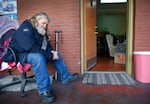For years, residents of Sandy Studios, a publicly-funded apartment complex in Northeast Portland for formerly homeless veterans, say their steady stream of complaints about the condition of the building went unheeded — until they became impossible to ignore.

NE Sandy Studios in NE Portland, March 29, 2021. All residents of this supportive housing for former homeless veterans are now relocating due to conditions of the facility.
Kristyna Wentz-Graff / OPB
At around 9 a.m. on January 24, a massive chunk of ceiling drywall crashed into unit #216 and onto resident David White, a 51-year-old army veteran, and his girlfriend.
“We made for the door, and we got out and brushed ourselves off and looked at it. There was just black mold everywhere,” White said. “It looked like there’d been a fire up there on the rafters.”
After the partial ceiling collapse and the discovery of large patches of black mold clinging to the rafters across the complex, city inspectors determined this month that Sandy Studios Apartments is unfit for human habitation.
It’s the latest chapter in what residents say has been a years-long tale of neglect playing out within the two-story brick building. The city began leasing the property in 2016 to offer permanent supportive housing to 50 of the city’s most vulnerable residents.
Just five years later, the building is poised to shut down prematurely due to “significant structural and air quality issues,” according to a notice residents received Friday. The abrupt closure implicates a litany of local agencies all of whom, residents allege, should have realized long ago the complex was uninhabitable.
The city-county Joint Office of Homeless Services, which inherited the lease from the city in 2016, budgets $640,000 a year for the property and support services. Do Good Multnomah, a nonprofit that serves homeless veterans, is paid to provide these services with staff on-site every day of the week. Home Forward, the local housing authority, provides housing vouchers to the vast majority of residents and said they inspect units before these tenants move-in.
But, increasingly, blame for the failing building has been pinned on the owner: local hotelier Ganesh Sonpatki, who owns budget motels across the region — including four others currently leased by the Joint Office for use as shelters.
Attorneys with Legal Aid Services of Oregon, a nonprofit that provides low-cost legal aid, are expected to file a lawsuit in the coming days against Sonpatki for failing to keep the property fit to live in. Sonpatki was also the subject of a class-action suit in 2019 brought by local tenants-rights attorneys for overcharging guests at his motels.
Sonpatki did not respond to an interview request for this story, but said in a statement that “the health and welfare of our community’s veterans are of the utmost importance.”
“Our first concern will continue to be the safety of all tenants and all future tenants,” he wrote.
White, who estimates three-quarters of his ceiling came crumbling down that day, is skeptical. He said the ceiling collapse was just the most blatant symbol of the problem residents had long been lamenting: critical maintenance needs going unaddressed by the building’s owner.
“It falls on their hands — they’re the owners of the property,” he said. “They should have maintained security and maintenance — and they didn’t.”

Drywall crashed into the unit of David White, a 51-year-old army veteran, and his girlfriend. It was followed by black mold that blanketed his apartment - including his sink.
Photo courtesy of David White
The property issues run the gamut. Resident Christina Kehoe said she’s had bed bugs on and off for three years. She keeps the lights on and wears a coat and beanie to bed to keep them off her while she sleeps. Mike Hamilton said he killed 15 rats in one day in his first-floor unit — a number he touts as his “personal best.” Christy Capps, who’s lived on the property for three years, said, despite flickering electricity and a bug infestation, she no longer bothers requesting repairs.
The Joint Office also appeared unsettled with the status quo. Last summer, stakeholders started fleshing out a “transition plan” for when the five-year-lease ends this June. The Joint Office wrote the current arrangement came with “a range of challenges,” including maintenance problems, a difficult relationship with Sonpatki, and a potentially unsustainable budget.
The motel, while old, was never cheap. Rent for each unit is $1,045 a month — a steep price for a small kitchenless studio apartment. A fraction is paid by tenants, who can also apply for federal vouchers and rent assistance. The Joint Office foots the bill for the rest.
The ceiling collapse sped up the departure. Soon after, city inspectors determined there was more than 10 square feet of mold growing across the complex. The city is expected to post a formal notice by the end of next week condemning the building.
The roughly 30 residents still living at the property are in the process of boxing up their stuff and moving to a Best Value Inn about five miles away. Do Good Multnomah said residents can live there for free until they can find permanent housing — an arduous task for formerly homeless veterans, even with case managers. Many face significant barriers to finding housing due to criminal records, prior evictions, and battles with substance abuse and mental illness.
Nathan Barton, an organizer with Portland Tenants United, the local tenants union that has been meeting with residents since last summer, said tenants are demoralized over the move, losing their housing without any certainty as to where they will land.
Chris Aiosa, the head of Do Good Multnomah, said they have no choice: the building is deteriorating — a fact he said has been obvious since day one.
Soon after taking over the lease from Cascadia Behavioral HealthCare in 2018, Aiosa said he sat down with staff from the Joint Office, his day-to-day property manager from Home First Development and the owner to figure out what needed to be done to improve the space.
“We went down a huge list of the areas that needed to be fixed — all the problems areas,” he said. “To be honest, I don’t think a single one was addressed.”
Aiosa maintains it was never the job of the nonprofit to maintain the facility. He said Do Good Multnomah was on-site to support the residents — their website offers services including addiction counseling, mental health assistance, and yoga. He said it is the responsibility of the owner to make big fixes on a building — and, speaking broadly, those holding the purse strings to see it through.

A tenant's door at NE Sandy Studios in Northeast Portland on March 29, 2021. All residents of this supportive housing for formerly homeless veterans are now relocating due to the conditions of the facility.
Kristyna Wentz-Graff / OPB
“There is a responsibility for entities that contract with individuals like him,” said Aiosa.
In this case, that entity is the Joint Office.
Records obtained by OPB show, in 2017, there were concerns within the Joint Office about continuing to contract with Sonpatki. After an inquiry by the vice president of housing for Cascadia Behavioral Healthcare, Jim Hlava, over whether the county would want to lease more property from the budget hotelier, a program manager from Multnomah County voiced concern, saying there had been a “number of issues” with Sonpatki following through on promised repairs at Sandy Studios.
Hlava responded that he had come to the conclusion that Sonpatki was in the business model of operating a “cheap motel.”
“He strives to “fix” things in the most inexpensive manner possible and by doing just enough to move something forward. He has been consistent with this approach all along,” Hlava wrote. “We’ve done a lot of pushing on things with him and he continues to do things in his way of doing business. I don’t think this will change much.”
Since then, the Joint Office has entered into four additional contracts with Sonpatki for shelters: three motels to house people during the pandemic as well as a long term lease at the Lilac Meadows, a family shelter in Northeast Portland.

Eric Hanson sits outside of his apartment at NE Sandy Studios in Northeast Portland, where he has lived for the past five years on March 29, 2021. Hanson's apartment is packed and in two days he must leave the apartment complex, a supportive housing for formerly homeless veterans, though he has not secured a place to live.
Kristyna Wentz-Graff / OPB
Denis Theriault, a spokesperson for the office, emphasized the nature of the leases in these four shelters is different from what was agreed to for Sandy Studios. Unlike that contract, the Joint Office is the leaseholder, giving county facility staff more leeway to handle day-to-day repairs. And because these are shelter programs and not private units, Theriault said, county staff has more freedom to access rooms and promptly address any maintenance issues.
As for Sandy Studios, Sonpatki wrote in his statement the company is installing a new roof and making necessary repairs to the building, although he made no mention of the mold. He said he plans to turn the space into 50 units of affordable housing.
Eric Hanson, 63, said he was the second person to move into Sandy Studios. After nearly five years in the complex, he is now on the hunt for new permanent housing — though said he has no interest in returning to the building.
“They can paint all the lipstick on this pig they want,” Hanson said, as he packed up his glassware Tuesday. “It’s still going to be a pig.”

